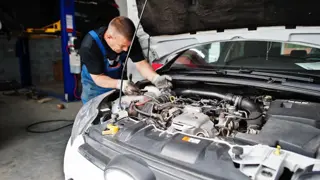
Automotive Control Systems
Self-paced videos, Lifetime access, Study material, Certification prep, Technical support, Course Completion Certificate
Uplatz
Summary
- Reed courses certificate of completion - Free
- Uplatz Certificate of Completion - Free
Add to basket or enquire
Overview
Uplatz offers in-depth and extensive training on Automotive Control Systems. This is video-based online course (self-paced training). You will be awarded Course Completion Certificate at the end of the course.
Automotive Control Systems are an application area of Automatic Control Science with increasing importance. A generation ago, vehicles were mainly designed by mechanical engineers. Today, about 1/3 of a vehicle’s added value is electronics. Customer-relevant vehicle functions are more and more determined by information and automation technology. The basic ideas of system dynamics, feed-back, and signal processing are vital for the development process.
Advances in automotive control systems continue to enhance safety and comfort and to reduce fuel consumption and emissions. Reflecting the trend to optimization through integrative approaches for engine, driveline and vehicle control, this book enables control engineers to understand engine and vehicle models necessary for controller design and also introduces mechanical engineers to vehicle-specific signal processing and automatic control.
Automatic control becomes more and more important for the automobile industry. In application areas such as passenger safety, environmental protection and passenger comfort, control functions are implemented in the vehicle electronic control units. In the engine control unit for example, there are several algorithms to reduce emissions, to improve the engine power output and to protect against damage from engine failures.
Compensation of drivetrain oscillations and the adaptive control of automatic gear boxes are examples for applications in the drivetrain area. ABS control, suspension control and vehicle dynamic control increase the drive ability of the vehicle and support the driver in dangerous situations. Airbag-systems with automatic recognition of seat occupancy improve passive safety of the passengers in case of an accident. Another large area of control applications are comfort functions like air-condition or navigation systems.
Most of these functions require sophisticated signal processing and control algorithms, which are based on models for the system dynamics. In this chapter it is impossible to present all the systems already available today. Therefore some of the most important models and controller designs are discussed, such as lambda, idle-speed and knock control in the engine and vehicle modeling and ABS braking in vehicle dynamics.
Curriculum
Course media
Description
Automotive Control Systems - Course Syllabus
- Thermodynamic Engine Cycle-I
- Thermodynamic Engine Cycle-II
- Engine Management System
- Diesel Engine Modelling
- Engine Control Systems-I
- Engine Control Systems-II
- Diagnosis -I
- Diagnosis-II
- Driveline Control-I
- Driveline Control-II
- Driveline Control-III
- Driveline Control-IV
- Driveline Control V
Trends in Automotive Control Systems
The most noteworthy trend in the development of modern automobiles in recent decades is their rapid transformation into complex electromechanical systems. Current vehicles often include many new features that were not widely available a few decades ago. Examples include hybrid powertrains, electronic engine and transmission controls, cruise control, antilock brakes, differential braking, and active/semiactive suspensions. Many of these functions have been achieved using only mechanical devices. The major advantages of electromechanical (or mechatronic) devices, as opposed to their purely mechanical counterparts, include
(1) the ability to embed knowledge about the system behavior into the system design,
(2) the flexibility inherent in those systems to trade off among different goals, and
(3) the potential to coordinate the functioning of subsystems. Knowledge about system behavior – in terms of vehicle, engine, or even driver dynamic models or constraints on physical variables – is included in the design of electromechanical systems.
Flexibility enables adaptation to the environment, thereby providing more reliable performance in a wide variety of conditions. In addition, reprogrammability implies lower cost through exchanged and reused parts. Sharing of information makes it possible to integrate subsystems and obtain superior performance and functionality, which are not possible with uncoordinated systems.
Who is this course for?
Everyone
Requirements
Passion and determination to achieve your goals!
Career path
- Automotive Control Engineer
- Automotive Embedded Engineer
- Control Engineer
- Automotive Engineer
- Electronics & Electrical Engineer
- Vehicle Informatics Engineer
- System Design Engineer
- Application Engineer - Automotive Software
- Automotive Product Engineer
- Lead Automotive Technician
- Automotive Performance Planning Engineer
- Electrical Design Engineer
- Vehicle Control Lead
Questions and answers
1. How will I practice? 2. What if I have queries during course 3. After finishing course, how can i get certification? Do I need to take exam?
Answer:Hi Ivan, To practice any SAP course you can purchase the software on a monthly basis. The S/4HANA TRM certification training is a video course. However, if you enroll in our SAP S/4HANA tutor-led online training, all your queries will be assisted by the tutor. You can send us an email after successful courses completion and we will be happy to issue you the certificate.
This was helpful.Need some more information plz 1. Is it cost 10Pound only? 2. Will I receive any study document/Course Material? 3. what is duration/time of this?
Answer:Hi Luna 1) Yes the cost is £10 only 2) Yes, you'll receive ebooks and other study materials free with this course. This material is downloadable. 3) The course duration is approx. 30 hours. You'll have lifetime access to the course videos. Hope this helps. Team Uplatz
This was helpful.Do I get the SAP certificate once I complete this course
Answer:Hi Aravind, You will receive a certificate from Uplatz mentioning that you completed this course. Thanks, Regards, Uplatz Team
This was helpful.
Certificates
Reed courses certificate of completion
Digital certificate - Included
Will be downloadable when all lectures have been completed
Uplatz Certificate of Completion
Digital certificate - Included
Course Completion Certificate by Uplatz
Reviews
Currently there are no reviews for this course. Be the first to leave a review.
Legal information
This course is advertised on reed.co.uk by the Course Provider, whose terms and conditions apply. Purchases are made directly from the Course Provider, and as such, content and materials are supplied by the Course Provider directly. Reed is acting as agent and not reseller in relation to this course. Reed's only responsibility is to facilitate your payment for the course. It is your responsibility to review and agree to the Course Provider's terms and conditions and satisfy yourself as to the suitability of the course you intend to purchase. Reed will not have any responsibility for the content of the course and/or associated materials.


